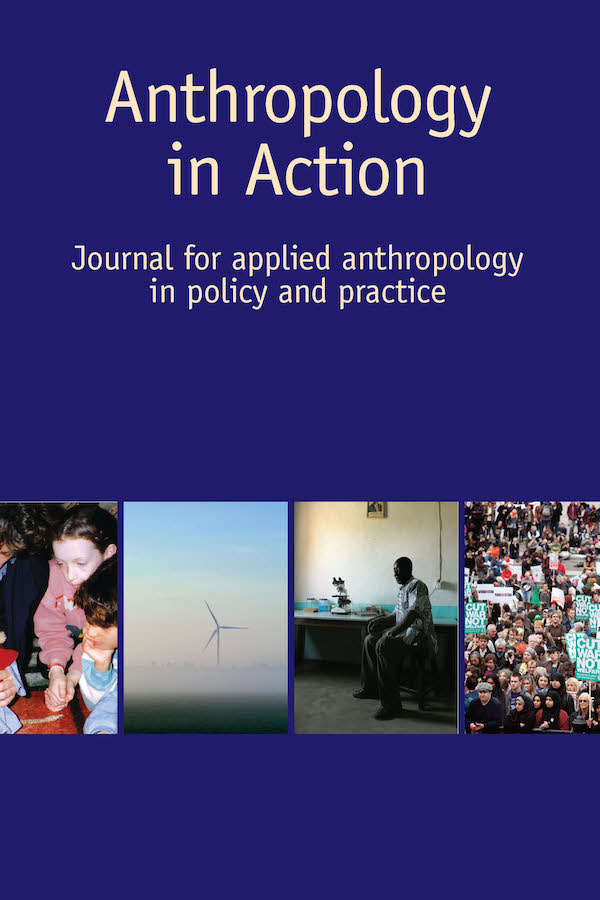
Anthropology in Action
Journal for Applied Anthropology in Policy and Practice
ISSN: 0967-201X (print) • ISSN: 1752-2285 (online) • 3 issues per year
Editors:
Dr. Pardis Shafafi, French National Centre for Scientific Research, France
Dr. Samira Marty, Binghamton University, US
Subjects: Applied Anthropology
Published in association with the Association of Social Anthropologists’ (ASA) Apply Network
Latest Issue
Volume 31 Issue 2
Anthropology in Action in Vanuatu
Troubleshooting Disaster Relief in the Wake of Tropical Cyclones Judy and Kevin
In March 2023, Vanuatu was struck by two category 4 tropical cyclones, dubbed Judy and Kevin, in rapid succession. As the planet heats up and extreme weather events become fiercer and more frequent, disaster response teams will face ever greater challenges to restore vital infrastructure and help the people living on Pacific islands to repair their homes and feed themselves. Based on the information gathered for this article using well-established anthropological techniques of in-depth open-ended interviews and long-term immersive fieldwork, we argue that effective responses to natural disasters may be strengthened by engaging more fully with local and traditional institutions, utilising the best available data and coordinating the efforts of more diverse stakeholders.
Honour, Survival and Protection
An Ethnographic Exploration of Homeless Women's Livelihood Priorities in Urban Dhaka
Violence and vulnerability shape and reconfigure the everyday realities and livelihoods of the socially and politically marginalised urban poor. Drawing on ethnographic fieldwork undertaken with women experiencing homelessness in Dhaka, Bangladesh, this article argues that reductive livelihood approaches fail to adequately take account of the workings of power or gender dynamics within socio-cultural contexts. In doing so, it engages in a deeply qualitative and ethnographic exploration of how precarious livelihoods are built, lost and rebuilt by homeless women who face chronic vulnerability and uncertainty. Women's livelihood priorities in this context included concerns over protection, survival and honour.
Immigrants as Reverse Anthropologists
Thresholds of Belonging and Hierarchies of Migration in the Experience of Italo-Pakistani Social Workers
This article explores nationhood and migration through a policy-adjacent ethnographic lens, observing the centre from the margins. It focuses on two Pakistani-born young men, Abbas and Nadeem, who work as social workers in an Italian refugee shelter. As children of migrants, they straddle roles of care and control within the asylum reception system. Their narratives reveal the paradox of being ‘domesticated’ into Italian society while instrumentalised in disciplining newly arrived migrants. They negotiate complex migrant temporalities and clashing perceptions of Italian-ness—both their own and that of native hiring managers. Can 1.5-generation migrants act as ‘reverse anthropologists’? And how can the ethnographer acknowledge their contributions as co-analysts of the field? The article examines these tensions and the fragile reciprocity of perspectives they enact.
A Clash of Science Policies
Interdisciplinary Collaboration and the Reflexive Gaze
Interdisciplinary collaborations between public universities and commercially driven institutions are on the agenda worldwide. While such collaborations are expected to provide innovative solutions, this article shows that actors from diverse disciplines have difficulties in establishing meaningful shared activities and obtaining the expected results. Based on ethnographic fieldwork in Copenhagen, I present a case in which the aim of reaching ‘usable’ knowledge in cross-sectorial interactions conflicts with the strategic work of academic institutions seeking to establish so-called entrepreneurial universities. I suggest that researchers encounter conflicting policies that disrupt interdisciplinary collaboration and strategic objectives. Furthermore, while the collaboration did not converge into innovative solutions, I conclude that it incited a reflexive gaze that opened possibilities for disciplinary self-awareness and consolidation.
Reviews
The Cinematic Reckoning of